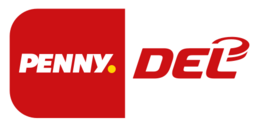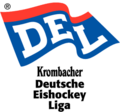Deutsche Eishockey Liga facts for kids
 |
|
| Formerly | Eishockey-Bundesliga |
|---|---|
| Sport | Ice hockey |
| Founded | 1994 |
| No. of teams | 14 |
| Country | Germany |
| Most recent champion(s) |
Eisbären Berlin (11th title) (2024–25) |
| Most titles | Eisbären Berlin (11 titles) |
| TV partner(s) | Magenta Sport ServusTV/DF1 |
| Level on pyramid | Level 1 |
| Relegation to | DEL2 |
| International cup(s) | Champions Hockey League |
| Related competitions |
DEL2 Oberliga |
The Deutsche Eishockey Liga (also known as PENNY Deutsche Eishockey Liga for sponsorship reasons), or DEL, is Germany's top professional ice hockey league. It was created in 1994 to replace the older Eishockey-Bundesliga. The DEL is special because it is managed by the teams themselves, not by the German Ice Hockey Federation.
Teams from the DEL compete in the IIHF's yearly Champions Hockey League (CHL). This is a big European tournament. The DEL is one of the best leagues in Europe. For the 2022–23 CHL season, it was ranked as the third-best league. This allowed its top four teams to play in the CHL.
The DEL is very popular! In the 2016–17 season, it was the second most-watched ice hockey league in Europe. On average, 6,198 fans attended each game. The league has 14 different teams. They play in various arenas, from large, modern ones in cities like Berlin and Cologne to smaller, older venues. Some teams, like Kölner Haie (Cologne Sharks) and Eisbären Berlin (Berlin Polar Bears), often have over 15,000 fans at their home games. The Adler Mannheim (Mannheim Eagles) also regularly attract over 12,000 fans. Even though Kölner Haie often have huge crowds, they have not won a championship since 2002.
Contents
Exciting Games and Atmosphere
The DEL is famous for its amazing game-day atmosphere. Fans are very passionate! The league also holds special outdoor games called the DEL Winter Game. These are like the NHL Winter Classic in North America. In 2019, Cologne and Düsseldorf played in front of over 40,000 fans in Cologne's RheinEnergieStadion. Düsseldorf won that game in overtime. The DEL Winter Game usually happens every two years. Four of these games have been played since 2013, with over 30,000 people attending each. The DEL Winter Game returned in December 2022, with Cologne hosting Mannheim.
The DEL has also helped develop talented players who went on to play in the NHL. Some of these players include Dominik Kahun, Tim Stützle, and Lukas Reichel. Many German national team players who won a silver medal at the 2018 Winter Olympics in Pyeongchang played in the DEL. In 2019, EHC Red Bull München became the first German team to reach the Champions Hockey League final. They lost to a Swedish team called Frölunda HC. Ice hockey is becoming more and more popular in Germany. It is a fun alternative to football or handball.
Promotion and Relegation
A new system for teams to move between the DEL and the DEL2 (the league below it) started in the 2021–22 season. The team that finishes last in the DEL gets replaced by the champion of the DEL2. For example, the SC Bietigheim Steelers joined the DEL for the 2021-22 DEL season as DEL2 champions. After the 2021–22 season, Bietigheim stayed in the DEL, but Krefeld Pinguine were moved down to DEL2. The Löwen Frankfurt (Frankfurt Lions) were then promoted to the DEL for the 2022–23 season.
Playoff System
The DEL Playoffs decide the season's champion. This system is similar to the NHL. Each team plays 52 regular-season games. The top 10 teams then qualify for the playoffs. The top 6 teams get a direct spot in the quarter-finals. Teams ranked 7th to 10th play in a special "pre-playoff" round. After each round, the teams are re-ranked. The DEL Finals are played in late April or early May. This final series is a "best-of-7" format. This means a team needs to win four games to become champion. The team with the better regular-season record gets to play more home games if the series goes to a seventh game.
Due to the COVID-19 pandemic, shorter playoff versions were used in the 2020–21 and 2021–22 seasons. The Eisbären Berlin won the 2022 Finals against EHC Red Bull München in a "best-of-5" series (winning 3-1). Berlin also won in 2021, beating Wolfsburg 2-1 in a "best-of-3" series.
Top Teams and Rivalries
The Eisbären Berlin and Adler Mannheim are the most successful DEL clubs. They have won many championships. Mannheim has been very successful recently, winning in 2015 and 2019. EHC Red Bull München won three championships in a row from 2016 to 2018. They also reached the 2019 final. Other teams like ERC Ingolstadt (2014 Champions) and Grizzlys Wolfsburg (2021 runners-up) have also had strong playoff runs.
Some of the biggest rivalries in the league include Kölner Haie versus Düsseldorfer EG, and Kölner Haie versus Adler Mannheim. Another big rivalry is between Eisbären Berlin and EHC Red Bull München. There are also exciting "Bavarian Derbies" between teams like München, ERC Ingolstadt, Augsburger Panther, Straubing Tigers, and Nürnberg Ice Tigers. These games are always very competitive. A memorable game happened in 2019 between Munich and Augsburg. Augsburg won a game after 104 minutes of play, which was the longest game in DEL history!
History of the DEL
The DEL was created for the 1994–95 season. It brought together teams from the old Eishockey-Bundesliga and the second division. The older leagues had many problems, especially financial ones. Many teams were in debt, and some even had to close down. This made it hard to find sponsors for German ice hockey.
In January 1994, most of the teams from the old leagues decided to create a new league: the DEL. The goal was to build a stable league, similar to the NHL in North America. Teams in the DEL had to follow strict rules to make sure they were financially strong. Twelve teams from the old first division and six from the second division joined the new DEL. The new league quickly found a big sponsor, Krombacher Brewery.
However, the new league still faced challenges. In its first season, one of the founding teams, EC Hedos München, had to close down because of money problems.
A big change came in 1995 with the Bosman ruling. This rule allowed players from other European Union countries to play without being counted as "foreign" players. This helped teams save money, but some fans didn't like how often players moved between teams.
In the 1999–2000 season, the league changed its name to "DEL – Die 1. Bundesliga." It also brought back the system of teams moving up and down between the DEL and the 2nd Ice Hockey Bundesliga.
The 2004–05 season was very special because of the NHL lockout. This meant that 26 NHL players came to play in the DEL that season! Famous players like Jamie Langenbrunner, Erik Cole, and German stars like Jochen Hecht played in Germany.
League Rules
The DEL is run by its 14 member teams. Each team must meet certain requirements to stay in the league:
- They must apply to be a member.
- New teams must have won the championship in the DEL2.
- Their stadium must meet DEL standards.
- They must be financially stable.
- They need to have a program for developing young players.
- They must buy a license, which costs €800,000.
The DEL can usually only add one team from the DEL2 each season. However, if the league has fewer than fourteen teams, two new clubs can join. Since the 2006–07 season, DEL teams are not automatically moved down to a lower league. A team only loses its spot if it doesn't follow the league's rules.
There is an agreement between the DEL, the German Ice Hockey Federation (DEB), and the DEL2. This agreement helps manage how the leagues work together.
In November 2007, the DEL announced it would expand to 16 teams starting in the 2008–09 season. This meant the DEL2 champions could directly join the DEL if they met all the requirements.
Also, each DEL team is allowed to have no more than ten players from outside the European Community. The regular season schedule was also set to 52 games for each team.
Teams in the DEL
Here are the teams playing in the DEL for the 2025–26 DEL season:
| Team | City | Arena | Capacity |
|---|---|---|---|
| Augsburger Panther | Augsburg | Curt Frenzel Stadium | 6,218 |
| Eisbären Berlin | Berlin | Uber Arena | 14,200 |
| Fischtown Pinguins | Bremerhaven | Eisarena Bremerhaven | 4,674 |
| Dresdner Eislöwen | Dresden | Joynext Arena | 4,412 |
| Löwen Frankfurt | Frankfurt | Eissporthalle Frankfurt | 6,000 |
| ERC Ingolstadt | Ingolstadt | Saturn Arena | 4,815 |
| Iserlohn Roosters | Iserlohn | Eissporthalle Iserlohn | 5,000 |
| Kölner Haie | Cologne | Lanxess Arena | 18,500 |
| Adler Mannheim | Mannheim | SAP Arena | 13,600 |
| EHC Red Bull München | Munich | SAP Garden | 11,000 |
| Nürnberg Ice Tigers | Nuremberg | PSD Bank Nürnberg Arena | 7,810 |
| Schwenninger Wild Wings | Villingen-Schwenningen | Helios Arena | 6,215 |
| Straubing Tigers | Straubing | Eisstadion am Pulverturm | 6,000 |
| Grizzlys Wolfsburg | Wolfsburg | Eis Arena Wolfsburg | 4,660 |
Former Teams
- BSC Preussen Berlin
- Frankfurt Lions
- Füchse Duisburg
- ESG Füchse Sachsen Weißwasser/Chemnitz
- Hamburg Freezers
- EC Hannover
- Hannover Scorpions
- Kassel Huskies
- Kaufbeurer Adler
- EV Landshut
- Maddogs München
- Moskitos Essen
- Munich Barons
- EC Ratingen "Die Löwen"
- Revierlöwen Oberhausen
- Starbulls Rosenheim
- SC Riessersee
- Wölfe Freiburg
- Bietigheim Steelers
- Krefeld Pinguine
Champions of the DEL
Past Champions
- 1994–95 Kölner Haie
- 1995–96 Düsseldorfer EG
- 1996–97 Adler Mannheim
- 1997–98 Adler Mannheim
- 1998–99 Adler Mannheim
- 1999–00 Munich Barons
- 2000–01 Adler Mannheim
- 2001–02 Kölner Haie
- 2002–03 Krefeld Pinguine
- 2003–04 Frankfurt Lions
- 2004–05 Eisbären Berlin
- 2005–06 Eisbären Berlin
- 2006–07 Adler Mannheim
- 2007–08 Eisbären Berlin
- 2008–09 Eisbären Berlin
- 2009–10 Hannover Scorpions
- 2010–11 Eisbären Berlin
- 2011–12 Eisbären Berlin
- 2012–13 Eisbären Berlin
- 2013–14 ERC Ingolstadt
- 2014–15 Adler Mannheim
- 2015–16 EHC München
- 2016–17 EHC München
- 2017–18 EHC München
- 2018–19 Adler Mannheim
- 2019–20 EHC München (RS) 7
- 2020–21 Eisbären Berlin
- 2021–22 Eisbären Berlin
- 2022–23 EHC München
- 2023–24 Eisbären Berlin
- 2024-25 Eisbären Berlin
Titles by Club
| Club | Titles | Winning years |
|---|---|---|
| Eisbären Berlin |
|
2004–05, 2005–06, 2007–08, 2008–09, 2010–11, 2011–12, 2012–13, 2020–21, 2021–22, 2023–24, 2024-25 |
| Adler Mannheim |
|
1996–97, 1997–98, 1998–99, 2000–01, 2006–07, 2014–15, 2018–19 |
| EHC Red Bull München |
|
2015–16, 2016–17, 2017–18, 2022–23 |
| Kölner Haie |
|
1994–95, 2001–02 |
| Düsseldorfer EG |
|
1995–96 |
| Munich Barons |
|
1999–00 |
| Krefeld Pinguine |
|
2002–03 |
| Frankfurt Lions |
|
2003–04 |
| Hannover Scorpions |
|
2009–10 |
| ERC Ingolstadt |
|
2013–14 |
Images for kids
-
Former DEL logo (1994–1996). The first two seasons were sponsored by Krombacher Brewery
See also
- List of German ice hockey champions
- DEL2
- Oberliga
 | James Van Der Zee |
 | Alma Thomas |
 | Ellis Wilson |
 | Margaret Taylor-Burroughs |




